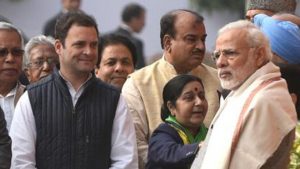288 total views, 7 views today
 India is the world’s fourth largest growing economy, its domestic politics have long been known to be influenced by coalitions and family dynasties. Prime Minister Narendra Modi whose Hindu Nationalist Party Bharata Janata Party (BJP) won an out right majority in the 543 member lower-house of parliament did not come from a political dynasty.
India is the world’s fourth largest growing economy, its domestic politics have long been known to be influenced by coalitions and family dynasties. Prime Minister Narendra Modi whose Hindu Nationalist Party Bharata Janata Party (BJP) won an out right majority in the 543 member lower-house of parliament did not come from a political dynasty.
In contrast to the secular Indian National Congress Party (INCP) which has been led by four generations of the Nehru -Gandhi dynasty in continuous succession since India’s independence in 1947. However, Modi who campaigned on a platform of social and economic reform has experienced a number of severe setbacks due to his large-scale ambitions.
The prime minister is now facing a vote of no confidence in parliament from a united opposition and that there is talk of return to a coalition government led by INCP leader Rahul Gandhi. But why would this motion be a success?
The Congress Party, led by Rahul Gandhi, has already reached an understanding with other opposition parties for nationwide cooperation, and it’s now working with small regional parties to build state-specific coalitions, said Congress leaders familiar with the development. The party is negotiating with regional leaders familiar with the development. The party is negotiating with regional leaders in up to a dozen states to improve its, lowest ever performance at the 2014 election and block BJP from retaining power, said the leaders, who asked not to be identified as they are not authorized to speak to the media.
“Coalition politics is the reality and it is there,” said PL Punia, a senior member of the Congress party, without giving details. “It’s not a strait-jacket formula. Our policy on coalition is a state-wise assessment and a state-wise decision.”
The Congress Party is certain to use Modi’s unpopularity to win a general election. The PM’s honeymoon is over and the BJP have to rethink their position. They still have an outright majority in parliament, so they can block the motion. But they are close to losing the next general elections if they do not resolve their current policy impasse. This is largely to do with how to do win elections at the state level. If all opposition parties voted in favor of the governing party’s removal then this will show they are strong enough to win enough seats to unseat the BJP in the next general elections. Their electoral strategy which focuses on the various states that make up India is aimed at weakening the BJP’s already weakening voting base at grass roots level.
If this goes as planned the congress and its allies will have a smooth election victory. Congress party president Rahul Gandhi also held a meeting with representatives of the Muslim community during which an Urdu Newspaper Inquilab claimed he said the INCP was a “Muslim party”.
After the reported statement created a storm in the political circles with Defence Minister Nirmala Sitharam who while accusing the Congress party of playing communal politics said, “The Congress is playing a dangerous game and is using the religion card in the run-up to the 2019 general election.” The Congress, Sitharam said, while speaking a language that was against the Constitution. She also cited Congress leader Shashi Tharoor’s remarks that India would become a ‘Hindu Pakistan’ if the BJP wins next year’s election. “Rahul Gandhi has to come out to say very clearly what he meant when he said the Congress is a Muslim party,” she said. “Let Congress President come out clear, is Congress a Muslim Party? Sitharaman said the Congress party shall be solely responsible for any polarisation between now and the 2019 elections.
The INCP which has based its political ideology on a secular, form of National Socialism has been seen as a more broad -based political party than the BJP which focuses on a more narrow, Hindu form of religious nationalism. Of course, whether the BJP, themselves would subvert the constitution for their own political agenda remains to be seen. The claim that the ICNP is a “Muslim party” may not sit well with the party’s more secular moderate and liberal followers who still see it as been a better option than BJP’s right-wing Hindu nationalist agenda. Modi himself when he was Chief Minister of Gujarat state came under a harsh tongue lashing for ignoring or even allowing the violence perpetrated against the right-wing Hindu nationalists against Muslims.
India may soon return to a government of coalition parties; the BJP majoritarian rule has resulted in a more chaotic form of Indian economics. Unless Modi resolves this impasse before the 2019 General elections the NICP will return to power and a fourth generation of the Nehru-Gandhi family will be at the helm of the prime minister’s office.
